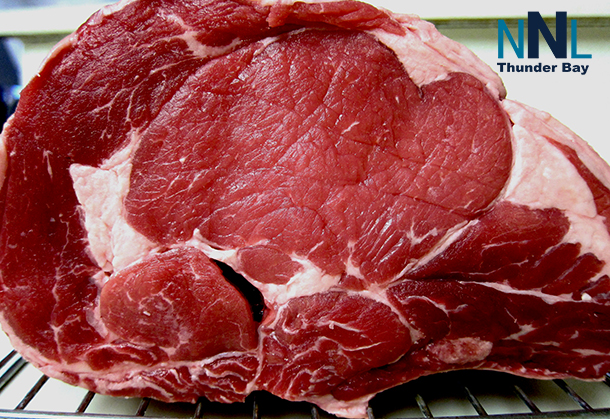
THUNDER BAY – LIVING – Red meat is one of our favourite foods, but is constantly under scrutiny as something that we should limit in our diets. Holly Freill, Registered Dietitian at Thunder Bay Regional Health Sciences Centre (TBRHSC), answers some common red meat and alternatives questions.
What is the current advice on eating red and processed meat? How can it impact my health?
Red meat can be part of a healthy diet, but the amount that you eat must be considered. Research suggests that consuming red meat is associated with an increased risk of colorectal cancer. For that reason, current recommendations suggest that red meat intake should be limited to 500g/week (16.5 oz) – the equivalent of approximately two 8 oz steaks.
The body of research surrounding processed meat is similar to that of red meat; that there is an association with developing colorectal cancer. For that reason, it is recommended that processed meat intake be limited and/or avoided.
What counts as red and processed meats?
Simply put, meat that is red when it’s raw is considered red meat. According to the United States Department of Agriculture (USDA), all meats obtained from livestock and large mammals are considered red meat. Generally, meat including beef, pork, moose and sheep is considered red meat while meat from fish, poultry and rabbit is considered white meat.
Processed meats are meats that have been preserved by smoking, curing or salting or the addition of chemical preservatives. Many processed meats also contain nitrates or nitrites. These food additives are important for preventing bacterial growth. They also give processed meat their typical colour and flavour. Research suggests that nitrates or nitrites may form cancer-causing compounds in our bodies.
How much protein do I need every day?
There is no simple answer to this question. Protein requirements vary greatly depending on body size, activity level and health status. Currently, the Dietary Reference Intake for protein is 0.8 g/kg/day for healthy, recreationally active individuals. This means that the average 180 lbs man needs only 65g of protein/day, and a smaller person, at 130 lbs, would only need 47g protein/day.
Based on typical eating patterns, most people easily meet or exceed their recommended protein intake. Most foods, even those we wouldn’t consider to be meat or meat alternatives, provide some protein. For example: if a person who weights 130 lbs eats 3.5 oz of ground beef (hamburger) and 2 eggs in a day, they are consuming approximately 25g and 12g of protein. Therefore, they have already consumed 79% of their daily recommended intake in less than 2 standard meals, not accounting for snacks either.
What can I substitute red meat with?

Just because you should try to limit your red meat consumption to less than 16.5 oz per week doesn’t mean that mealtime will be boring or flavourless. There are many great substitutions for red meat. Beans and lentils are an excellent place to start. Chickpeas or Romano beans can be added to salads for bulk and texture. Grilled portobello mushrooms are a fantastic hamburger alternative while ground chicken or turkey goes nicely into chili.
For more information on nutrition, healthy recipes, meal planning, or to contact a Registered Dietitian, visit www.eatrightontario.ca. You can even make your own food guide by visiting Health Canada’s website and search ‘Create my food guide’.
Learn more on February 25th
You can also find out more tips about red meat alternatives at TBRHSC’s February Healthy Get-Together with Holly Freill as the featured speaker. This session is on Wednesday February 25th from 7:00 – 8:00 pm in the ICP Main Meeting Room (2178) at TBRHSC. Call 684-7237 to RSVP. Parking is free.






